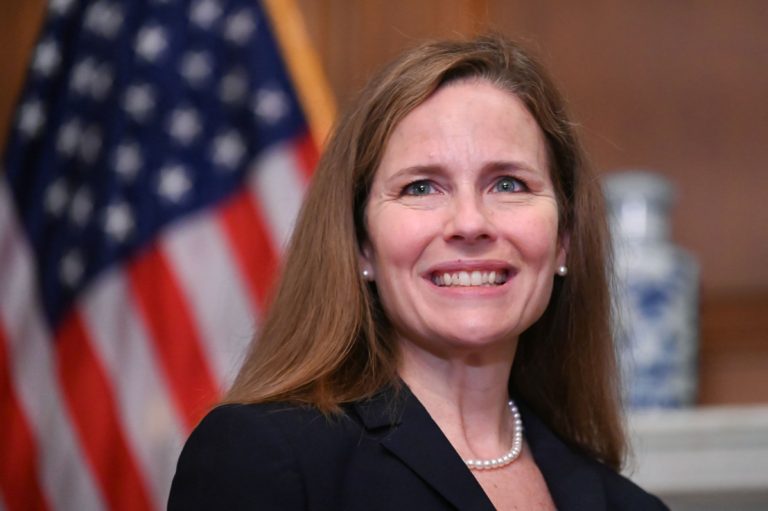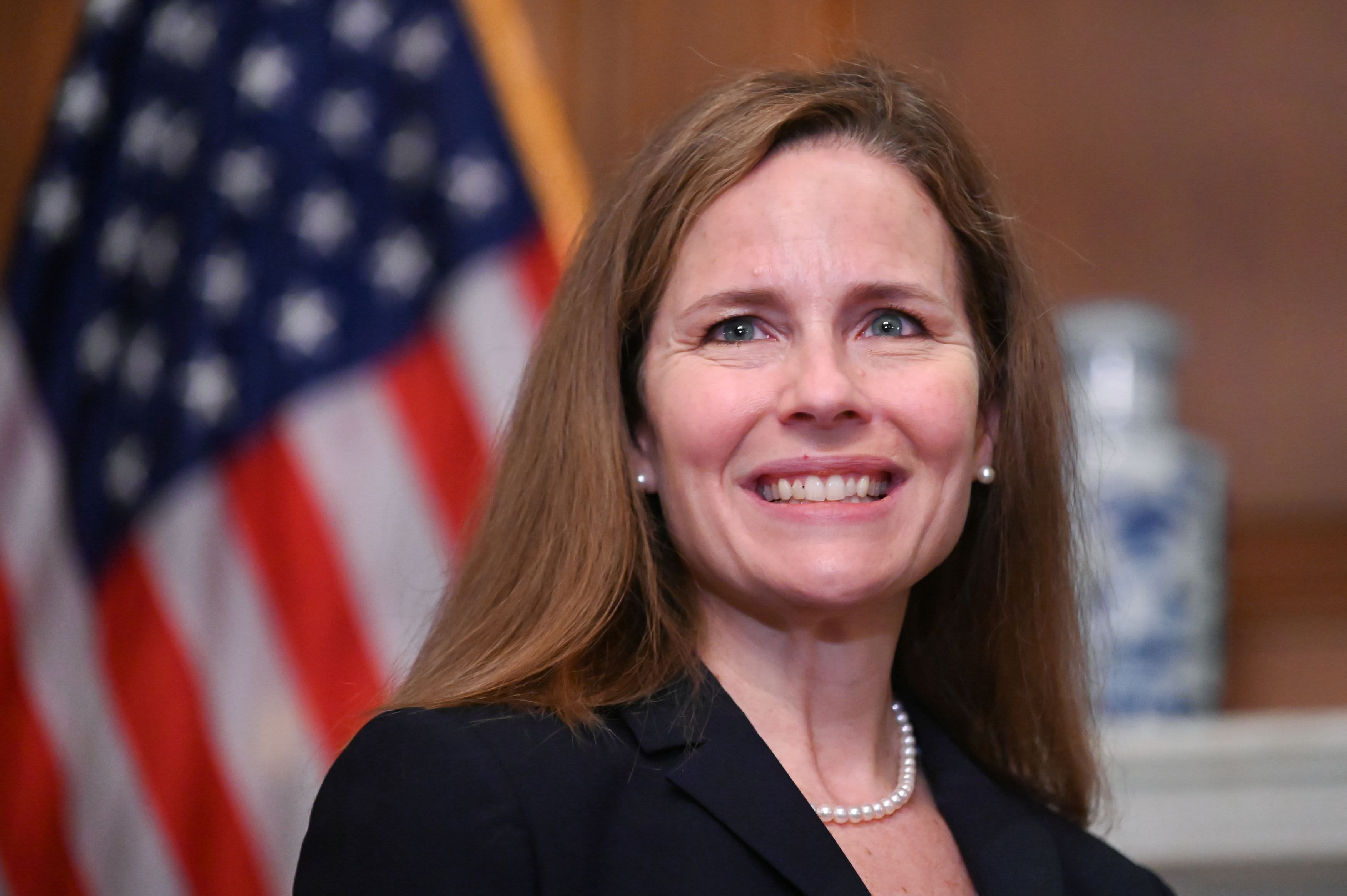

Judge Amy Coney Barrett, U.S. President Donald Trump’s nominee to the Supreme Court, poses during a meeting with U.S. Senator Mitt Romney (R-UT) on Capitol Hill in Washington, U.S. September 30, 2020.
Erin Scott | Reuters
The Supreme Court is set to hear a case concerning the rights of gay and lesbian Americans on Wednesday morning in a dispute that advocates are warning could pierce holes in the nation’s anti-discrimination laws.
Arguments, which will take place just a day after the presidential election, will mark the first major fight to come before Justice Amy Coney Barrett, who was sworn in a week ago.
Religious rights activists are pushing for the court to use the case, Fulton v. City of Philadelphia, to overturn a 30-year-old precedent that has for decades mediated the balance between freedom of conscience and the rights of minority groups.
Doing so could effectively reverse the court’s trend in recent years of advancing protections for LGBT people, civil rights advocates warn. The case could also weaken laws protecting other groups, including Jews, Muslims and Mormons.
The case concerns a Roman Catholic adoption agency in Philadelphia that claims that it can’t match foster children with same-sex households without violating its religious beliefs.
After learning about the policy in 2018, Philadelphia refused to refer the group new foster children, citing a city law that prohibits discrimination on the basis of sexual orientation. The city added language to its 2019 contracts specifically prohibiting such discrimination against potential foster parents.
The group, Catholic Social Services, is suing to defend its ability to refuse to work with same-sex households. In court papers, the group has argued that Philadelphia’s moves unlawfully targeted its right to exercise its religion, which is protected under the First Amendment.
Philadelphia, on the other hand, has said it is entitled to enforce anti-discrimination policies in order to protect LGBT residents. The city says it is not hostile to religion, noting that its policies apply evenly to religious and secular government contractors.
The 3rd U.S. Circuit Court of Appeals sided with Philadelphia in a unanimous decision in April 2019. Circuit Judge Thomas Ambro, writing for the court, said CSS failed to show that the city was motivated by anything other than “sincere opposition to discrimination on the basis of sexual orientation.”
The Third Circuit ruling relied heavily on the 1990 Supreme Court precedent known as Employment Division v. Smith. The ruling, authored by the late conservative Justice Antonin Scalia, held that laws that burden religious exercise are typically permissible as long as they are generally applicable and do not target religion.
In its appeal, Catholic Social Services has asked justices to overturn Smith and implement a new standard.
“Catholic Social Services stands to be excluded from foster care, not because it broke any law, but because Philadelphia disagrees with its religious practices regarding marriage,” an attorney for CSS, Mark Rienzi, told the justices in a filing.
Philadelphia and two nonprofits that are challenging CSS in the case, Support Center for Child Advocates and Philadelphia Family Pride, argue that any standard that provides the agency the constitutional right to discriminate against same-sex couples would have broad ramifications.
Cecelia Paul, deceased plaintiff in Fulton v Philadelphia, taken at her home in Philadelphia in May 2018
Becket
“It would mean governments’ hands would be tied and they would not be able to enforce any anti-discrimination laws,” according to Leslie Cooper, an ACLU attorney representing the nonprofits.
“The court has in a number of cases recognized that LGBT people must be treated with the same dignity and respect as others,” Cooper said.
She said that in this case, a win for CSS “would essentially give anyone who objects to LGBT people and cites a religious basis for that the right to opt out of all those protections that achieved equal treatment for the LGBT community.”
Lori Windham, who will be arguing in court on Wednesday for CSS, said those objections are exaggerated.
“It’s completely overblown. Catholic Social Services has been partnering with women of color for decades to service a diverse population,” Windham said. “They are asking to continue to do that.”
While Smith has been on the books for three decades, there is good reason to suspect that the top court, now with a 6-3 majority of Republican-appointed justices, may overturn it. Just last year, four of the court’s conservatives, Justices Samuel Alito, Clarence Thomas, Neil Gorsuch and Brett Kavanaugh, suggested obliquely they were open to doing so.
With Barrett on the bench, the court, already friendly to religion, is expected to become more so. But that doesn’t necessarily mean she will vote to overturn Smith.
“She clerked for Justice Scalia. Will she, in the first week or so of her time on the court, be running toward overturning a three-decade-old precedent written by her old boss?” asked David Flugman a partner at the law firm Selendy & Gay with experience litigating high-profile civil rights cases.
But Flugman said that despite that nuance, Barrett’s addition to the court likely added to the possibility of a sweeping ruling.
A win for CSS could take several possible forms. Katherine Franke, faculty director of the Law, Rights, and Religion Project at Columbia University, said it was possible the court could overturn Smith without explicitly crafting a new standard.
But based on recent cases in which the court has interpreted the federal Religious Freedom Restoration Act, Franke said it was more likely the court would create an higher standard for reviewing laws that affect religion than existed even before Smith was decided in 1990.
“Many of us in the business call this religious liberty on steroids,” she said.
Flugman said the tension between religious freedom and LGBT equality at the heart of the case is the “fundamental issue in the LGBT rights space right now.”
“The real world consequences of this could be really, really, really important to people,” Flugman said. “From denial of health care, to exclusion from schools, or refusing to serve people in restaurants or not accommodating them in bed and breakfasts.”
The court confronted a situation along those lines in the 2018 case known as Masterpiece Cakeshop, in which a Christian baker refused to make a wedding cake for a same-sex couple. The court sided with the baker, but did so on such narrow grounds that the ruling didn’t apply to most other similar cases.
The Masterpiece decision, though just a few years old, may effectively be from another era. It was written by Justice Anthony Kennedy, the chief defender of LGBT rights on the Supreme Court, just weeks before he retired.
With Kennedy’s departure, Franke said, the court embarked on a new phase in its religion cases, in which religious rights started to be elevated above all others.
“Justice Kennedy saw all the rights secured in the Constitution in a delicate balance with one another, where this current majority sees some rights as more fundamental than others,” Franke said. “We are beginning to see a sort of tiering of rights, where some are top tier rights, and others are middle tier rights.”
The conflict between those “top tier” rights — religion and gun rights, among others — and “middle tier” rights was on display last term, Franke said.
In rulings issued in June and July, the justices shielded religious schools from discrimination lawsuits brought by teachers, allowed religious employers to deny their workers access to free contraceptive coverage, and paved the way for religious schools to receive taxpayer dollars.
But the justices also upset religious conservatives by ruling, in the case Bostock v. Clayton County, that Title 7 of the Civil Rights Act protected gay and transgender workers from being fired on the basis of their sexual orientation or gender identity.
Franke noted that the cases favoring religion were written in soaring language, while Gorsuch’s opinion defending gay and transgender workers was workmanlike — and left open the possibility that religious employers could claim an exemption from Title 7.
“I see that when these are going to come up against each other, the deep normative reasoning of the religious liberty cases will just overpower the mechanical reasoning of the equality cases or the reproductive rights cases,” Franke said.
Mary Bonauto, an attorney at GLBTQ Legal Advocates & Defender, wrote in a filing submitted to the justices that Bostock and the court’s previous cases had “profound significance for LGBTQ people’s ability to sustain themselves and their families and to participate in the economic life of our nation.”
Fulton, she wrote, puts that “incipient equal citizenship at serious risk.”
A decision in the case is expected by the end of June. The case is Fulton v. City of Philadelphia, No. 19-123.